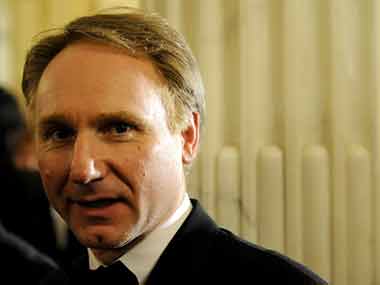New Delhi: Survival in an increasingly shrinking world depends on ability to ask difficult questions and engage in dialogue with people having ideas different to one’s own, according to celebrated US author Dan Brown. “The world is getting smaller everyday and now more than ever there is enormous danger in believing that we are infallible. That our version of truth is absolute and that everyone who does not think like we do is wrong and therefore our enemy,” said the “The Da Vinci Code” author. [caption id=“attachment_1797041” align=“alignleft” width=“380”]  Author Dan Brown presented the 8th Penguin Annual Lecture in New Delhi. AFP[/caption] Brown, whose widely read novels interrogate the relation between science and religion, was here to deliver the eighth Penguin Annual Lecture on Monday on codes, science and religion. Brown, who had visited India 30 years ago as a 19-year-old, said he received a “welcome that was warm” and he was waiting for “the right excuse to come back”. “For one’s own survival, it is critical that we live without malice that we educate ourselves and that we ask difficult questions and above all we engage in dialogue especially with those whose ideas are not own own,” he said. Calling the present times as “a very exciting era,” Brown said, “Right now in the first time in history the line between science and religion has started to blur.” Science and religion, for him are simply partners, two different languages attempting to tell the same story. “Both are manifestations of man’s quest to understand the divine. While science dwells on answers, religion savors the questions,” said the author of “Angels & Demons”, “The Lost Symbol”, “Inferno”, “Digital Fortress” and “Deception Point”. Science and religion have for time immemorial battling to be provide answers to man’s questions, he said. While tackling complex questions, scientists use phrases like “uncertainty principle” and “theory of relativity,” and physics becomes metaphysics and numbers become imaginary. At the same time there are a part of scientists who have religious experiences. “Hindu sanyasis are reading physics books and learning about the experiments which they believe in their hearts for centuries but unable to quantify.” Brown also talked about the evolution of religion and the “God of Gaps”. From infertility to earthquakes, diseases even love there was a god to explain everything which later was filled by explanations by science. “Ironically we turn to God now for only for a handful of existential questions which science has never been able to answer like ‘Where did we come from? Why are we here? And what happens when we die?” Brown said. He began the lecture by giving a snapshot of the world he grew up in surrounded by both science and religion. In his family’s garage, his mother, a professional musician, owned a vehicle with the licence plate “Kyrie”, which meant the Lord in Greek and his mathematician father’s car sported the licence plate “Metric”. Brown recounted his experience of having his book “The Da Vinci Code” adapted into a film after resisting the idea for much time. Much to the mirth of the audience, Brown recounted the moment when he tried on a Scottish kilt alongside actor Tom Hanks, who plays the role of Harvard symbologist Robert Langdon. Brown is currently working on a new book as well as a film version of his most recent novel “The Inferno.” He wrote his first book at the age of five titled “The Giraffe, the Pig, and the Pants on Fire”. PTI
Survival in an increasingly shrinking world depends on ability to ask difficult questions and engage in dialogue with people having ideas different to one’s own, according to celebrated US author Dan Brown.
Advertisement
End of Article
Written by FP Archives
see more


)
)
)
)
)
)
)
)
)



